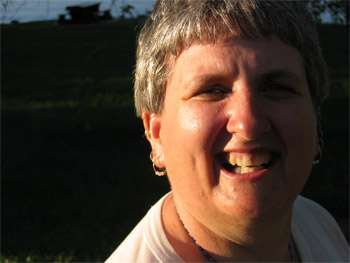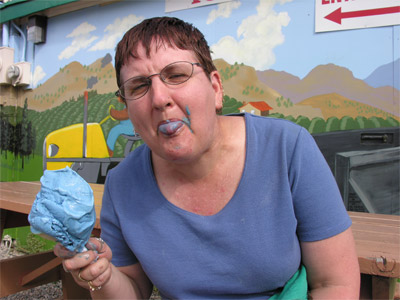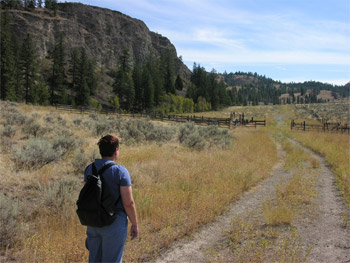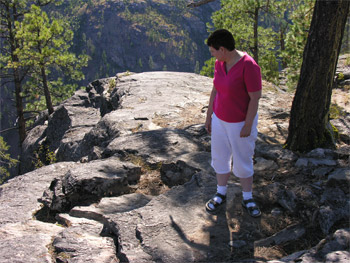INTERVIEW: on Being ‘Slow’
- 12.28.13
- Mind, Emotions, slow coordination, slow mind
- 4 Comments
ON BEING SLOW
An Interview
My very first interview had to be with my sister, I didn’t even consider anyone else. She knew that for years I’d been developing some project that was important to me, but she didn’t know what it was.
She’s caring and giving and non-judging of these things, and I knew she’d help in a large, patient way. I knew my first interview would be brimming with uncertainties and inexperience – I’d never done an interview in my life – so I wanted agreeable help from a positive person, and I knew exactly where to go.
She mentioned a couple other things she could talk about, but when I asked what the most important thing was, she answered instantly.
Jill – “I describe it as being SLOW, having slow coordination physically, and not retarded mentally, but not normal either. It’s like a disability that’s kind of in-between, not black or white. It’s the grey area. You can’t right away tell that I have it – it’s not obvious immediately, but after awhile they begin to pick it up.” (That there’s something different about her)
FIRST GLIMPSES
“I could tell at an early age that I was different, but of course I couldn’t say or pinpoint it in words when I was seven, eight, nine years old. I didn’t know what it was, I could just tell my coordination wasn’t good like other people.
I used to come home and say, ‘Why am I slow?’ Mom and Dad could never give a good answer to satisfy me. They (parents, doctors, the world) didn’t know as much about these things back then.
When you’re in school and you can’t do things, back then they just said, ‘She can’t do it’.”
FIRST PROFESSIONAL HELP
“Finally we moved to a larger city, where there was more up-to-date material available; there were more books, and the doctors knew more up-to-date stuff. Then I went to my first therapist about it. He gave me all kinds of exercises in order to test my reactions and coordination, like dribbling a basketball and hitting a balloon. And he wanted to also see my emotional reactions to things, so he gave me exercises for these, too; like he gave me a pillow and asked me to punch it, to act like I’m angry.
He said to try pretending you’re fighting with your brother like when you argue, but I couldn’t get mad. I could hit the pillow hard, instead of just tapping it, but I couldn’t think of anything to make me mad enough to punch the pillow for, so I just sat there punching the pillow hard and laughing. I could never frown; even after years with that therapist, I still couldn’t think of something to get me mad.
Then we moved, and I went to this other therapist, the one who’s behind bars now, just recently, for defrauding his clients (patients). They gave me exercises to practice at home, like on the honor system. For example, they said to pretend that you’re acting mad. I really couldn’t figure out what those exercises were supposed to be for. I don’t think they helped me.
Oh, yes, I remember; they were to help me accept myself, because I didn’t accept myself.”
FEELING BAD
“When I was slow, I didn’t accept it. I always talked about committing suicide. I didn’t do it, but I thought, I talked about it. I thought all about how I was going to do it, why I was going to do it, I felt nobody wanted me. That started back in like grade ten, eleven. I was around sixteen, seventeen.
I don’t know if Mom and Dad ever knew. Even after graduation, I still thought about it. I still do. As close as I ever got was to cut myself with glass. Just enough to try; I was too scared to do it really deep enough to… because I chickened out. They’re just little scratches that healed. I was always too scared to do it.
But when I get in that mood now, (boyfriend) hears about it. When I have my bad days. Before, when I had my real bad days… there was no one to tell. ’Cause I couldn’t tell Mom and Dad. Just (boyfriend), later. Even after I started seeing him, it stayed with me. It still does.
When I have a panic attack I still talk to him like that – ‘I’m going to kill myself, why should I live’, and, ‘I don’t have anything going for me’. Then he’ll give me a list of things I have… like I have him. But I’m like, ‘Yeah, well I don’t have a job, and I can’t do any goals, and those are real important things to me’.”
Life isn’t enough – just being able to go for walks, enjoy what you have each day?
“No. It’s not enough. (To make up for the disability and make her feel generally happy each day) I know people would feel bad if I died. They would. I may understand that, but… but I’m not going to commit suicide, so you don’t have to worry.”
ANXIETY ATTACKS
Anxiety attacks can involve panicking in enclosed spaces, crowded places, and in stressful situations – feeling terrified, gasping for breath, shaking uncontrollably, falling down, crying and/or becoming hysterical, needing to escape, and other symptoms. There are steps – therapy, exercises, and medication – to help lessen their intensity, even to help eventually grow past the attacks.
“The panic attacks started when I was young, I remember having them way back in elementary school; the shakes, the dizziness. I’d go to people, Mom or Dad, saying I felt strange or bad, but they brushed it off, saying nothing’s wrong with me. I didn’t have attacks to the extent (frequency and magnitude) of later years, but I definitely knew something was wrong with me.
I know why the attacks stayed with me forever: it’s because when you’re small and somebody keeps repeating the same things over and over your whole life, that’s what causes you to learn it. They didn’t say like, ‘You’re dumb,’ or, ‘You’re stupid,’ they just used the sentence, ‘You’ll never be able to do this, or that,’ and that sentence was repeated right through my whole life. And the teasing.
Then when something (nowadays) reminds you of it (her past), it just triggers an attack, even when you’re not consciously thinking about it.”
That is, as an adult she is reminded of how people and life were hard on her when she was young, how frustrated and powerless she felt. The anxiety – and subsequent attacks – mostly happen when she walks past high schools, goes into crowded shopping malls and buildings, or feels trapped when someone is badgering her or pressuring her about something she can’t understand…
NOT HAVING SKILL
“I always figured I was a good volleyball player. I always served good. But I was never recognized for my serving. I could hit the ball, but I couldn’t volley. But the teachers always had their ‘pets’ (favorite players) they wanted to play, and I would sit on the bench. Then at other things: I’d see there’s some other kids that can’t do something well, but they weren’t teased so much because they could do something better in a different way. (A different subject or skill)
I could never find a different way to do things – I was slow at everything. Whereas other people would be slow at just a few things, I was slow at everything. I don’t think there was one thing positive. And that’s why it’s tough with me. Always being picked last for things (like teams for gym class), and the name-calling.
They didn’t see what I was good at… the whole picture. Kids, teachers, friends or other adults didn’t go by how good you are. I thought I was good, but I didn’t get enough praise, except from Mom and Dad. But that didn’t help too much because I had to be around other people in my life too, and if people around me had given me more positive treatment I wouldn’t have these anxieties, all these panic attacks.”
 HOW OTHERS TREAT
HOW OTHERS TREAT
“Something that really hurts was people always saying, ‘You can do it – anyone can do it,’ or, ‘How come you don’t get it? Anyone can understand this’. That really hurts, and everyone does it to me. But I can’t understand what they’re showing me. They think it’s so simple, and that I’m normal, so they keep thinking I can understand. If I was really handicapped they wouldn’t say that, but because I’m in the grey area they always say that. It makes me feel so bad.
Even I think I can do things, too; I always used to see something I wanted to do, and I’d get all confident and think it would be easy, like I can do it. Then I’d try, and couldn’t do it. Even simple things.
If I could go back in time, and choose between being nicer, or having the coordination?
… I think I’d go for the coordination, now. I’d definitely go for the coordination, knowing what I know now. I could work at the being nicer part. (But can’t work at the coordination) It seems like coordination gets you everywhere, nowadays.”
Most of us have had good coordination since birth so it’s a non-issue, not something we ponder. To her it would be an incredible gift to wake up with even average coordination and speed.
“Like, my favorite sport I wanted to keep up was badminton. But even as adults, people are ‘cliquey’, they have these groups and no one asks me to play. I know I’m slow, but sports are supposed to be just for fun at a recreation centre. If it was for competition, I could see it. But they stay in their own (better-playing) groups even just for fun. So it doesn’t change after you get out of school.
Even at (a local volunteer program), they played favorites. Like I would do a job for five days a week, and (another worker) would only work two, but she’d get the credit because she was more popular. No one would praise me, or even recognize my contributions. On awards days, other people get praised, they get trophies for their work, and I didn’t get anything. Sometimes I did more than them, but I wouldn’t get any praise.”
PRAISE
“I need some praise. I don’t need praise all the time, but it would be nice, even once every one or two months. But when I don’t get it at all, I feel… useless. Even doing housework, chores; it would be nice to hear praise once in awhile. But it’s never. I guess I know on a deep level that it’s appreciated, but then sometimes I still don’t feel like it is. Sometimes I just need to hear it, I need to hear I’m appreciated.
Without having to remind people. I always have to remind them if I want praise. Then they’re sorry and they say thanks, but then months go by and again there’s nothing, and I eventually feel so bad I have to ask for it again, they haven’t said anything. It’s not like I need it every day. Why can’t they say it just every month or so…?
I do; when people are doing something, I go out and say ‘Nice job’ or something, because people like to hear it. But when it comes to the reverse… nothing. It doesn’t happen at all.”
She praises others often and sincerely, heart-felt. She fully understands how much people need praise. Most of us don’t think to praise the people who don’t ‘stand out’ at their tasks, their skills.
WORKING
“That’s why I can’t find work; they expect me to do it as good as everyone else, and when I can’t, they fire me. They never even give me a chance. (To keep working even though she’s slower at doing things) Even in the training program jobs (for people who have difficulty learning) they’re supposed to give you a trial period of six months at a job, but they let me go after only two weeks.
At (a fast food restaurant) I didn’t even get to the cooking part, the cash register and other jobs; I was just bussing and cleaning tables, and they still thought I was too slow.
In some ways, it would be easier if I was really handicapped, like retarded, or physically. At least then they would know, they’d be more understanding. They would know what to expect. But when I’m half way like this, they just expect the same job (quality, speed) as anyone else, and I can’t do it.”
HELPING OTHERS
What could she say to someone younger who has the same disability, something she’s learned that could help them have a better life?
“I could say that I have my ups and downs, and they’re the same as everyone else. Sometimes I have really bad times because of it, wishing I could be different and do more things and be treated different. And then there’s lots of ‘up’ times, too. I think I have longer up times than most people; it’s all how your attitude is.
The most important thing I could say is to accept that you can’t ‘get over it’. My parents, teachers always told me, if you study harder, just keep practicing, you’ll eventually get it (learn what you’re practicing). Like learning to type, for example. They say I could work up to maybe sixty words per minute, just try hard, keep doing it. But even after two years, I was still stuck at about ten words per minute.
When you’re slow, you’re just slow. It’s the way your body works, and your brain. You can’t just ‘get over it’. That’s not just with typing; every single school class, I had to bring studies home to get extra help with. For years, they’d (parents) be showing me, explaining things, screaming at me sometimes, but I couldn’t do it (understand the lessons). I’d try, but I just can’t get things. I’d be crying, like almost every night. School was really, really hard.”
You can tell her statements represent only a tiny part of how hard her young life was in school; how would you and your friends, as children and youths, think of the person in class who was different? How did you treat them, how did the teachers treat them, how did it feel for them to always have their work, their homework, compared to the other kids’ and have it come up lacking, full of mistakes? It’s like that, for them, every day and night for those years of the most impressionable time in their lives.
RESULTS NOW
“There are so many things I wanted to do, and now it hurts because I’m forty years old and still can’t do them. I feel like my life is passing me by, and other people are doing great things and I’ve done nothing. Like, I see people who are real athletic, they can do sports great. Or someone’s a great artist. It seems like everyone can do something good except me.
I don’t know if someone can still have a good life despite being slow, or still be happy… I guess that depends on if you find something to make you happy. Like a job you like, or the special someone…
I have my ups and downs. I think I have longer ups than most people with disabilities.”
Since you’re in the grey area where it’s not a very obvious, visible incapacity – like someone who’s lost their legs or someone who’s severely retarded – are your up times longer because it isn’t as severe with you as with many others?
“I don’t know. That’s a good question.”
IN THE END, WHAT MATTERS:
“But for the most part, I turned out pretty good. I think I’m a good person.”
Jill
40
Penticton, B.C.
I’ve learned to be kinder and more considerate in large part by watching how Jill treats people. She has the most accepting, helpful, golden heart of anyone I’ve met in my life. I’ve moved around a lot, and I look for this quality in people, but so far she shines the brightest.







only just found this website, I will be back, just sad I don’t have time to read everything so far.
thanks to all involved.
Very beautiful and insightful. Jill is a beautiful woman and she should be very proud an inspiration to us all. X
I went to an incredible talk recently in London, England by this young dyspraxic woman who has become a dancer. Your sister’s story reminded me of her very much. I will try and find out her name for you.
Thank you, Sam. You’ve introduced us to a word we haven’t heard before, ‘dyspraxia’. We’re looking into that. I’ve emailed you.